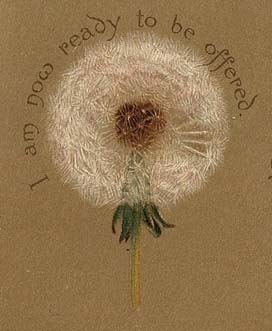Measure thy life by
loss and not by gain,
Not by the wine drunk, but by the wine poured
forth,
For love's strength standeth in love's
sacrifice,
And he who suffers most has most to give.
Death to Self
is the Way Out Into a Life of Sacrifice
This dandelion has
long ago surrendered its golden petals, and
has reached its crowning stage of dying - the
delicate seed-globe must break up now - it
gives and gives till it has nothing left.
What a revolution
would come over the world - the world of
starving bodies at home - the world of
starving souls abroad - if something like this
were the standard of giving; if God's people
ventured on "making themselves poor" as Jesus
did, for the sake of the need around; if the
"I" - "me" - "mine" were practically
delivered up, no longer to be recognized when
they clash with those needs.
The hour of this new
dying is clearly defined to the dandelion
globe; it is marked by detachment. There
is no sense of wrenching; it stands ready,
holding up its little life, not knowing when
or where or how the wind that bloweth where it
listeth may carry it away. It holds
itself no longer for its own keeping, only as
something to be given; a breath does the rest,
turning the "readiness to will" into the
"performance" (2 Cor. 8:11). And to a
soul that through "deaths oft" has been
brought to this point, even acts that look as
if they must involve an effort,
become something natural, spontaneous, full of
a "heavenly involuntariness," so simply are
they the outcome of the indwelling love of
Christ.
Shall we not ask God
to convict us as to where lies the hindrance
to this self-emptying? It is not alone
mere selfishness, in its ordinary sense, that
prevents it; long after this has been cleansed
away by the Precious Blood there may remain,
unrecognized, the self-life in more subtle
forms. It may co-exist with much that
looks like sacrifice; there may be much of
usefulness and of outward self-denial, and yet
below the surface may remain a clinging to our
own judgment, a confidence in our own
resources, an unconscious taking of our own
way, even in God's service. And these
things hold down, hold in our souls,
and frustrate the Spirit in His working.
The latent self-life needs to be brought down
into the place of death before His breath can
carry us hither and thither as the wind wafts
the seeds. Are we ready for this last
surrender?
Do you ask, "Does God
really mean the emptying to reach so far as
this?" Study the inner life of Jesus. "I
speak not of Myself," He says. "I can of
Mine own self do nothing." "I seek not
Mine own will, but the will of Him that sent
Me." His human self-life, sinless though
it was, was laid down that He might live by
the Father; and our self-life, defiled and
worthless, shall we not lay it down that we
may live by Him?
But how? Again
not by struggling and wrestling, but by dying
to it in Jesus. "I am crucified with
Christ" - I myself in the very essence of my
being, I let myself go to that death; and by
the mysterious power with which God meets
faith, I find that He has made it true: the
bonds are loosed and He can have His way with
me...
Shall we not let Him
have His way? Shall we not go all
lengths with Him in His plans for us - not, as
these "green things upon the earth" in their
unconsciousness, but with the glory of free
choice? Shall we not translate the story
of their little lives into our own?
For all their
teaching of surrender and sacrifice is no
fanciful mysticism; it is a simple reality
that can be tested at every turn - nay, that must
be so tested. If we are apprehending
Christ's death in its delivering power, our
homes will not be slow to find it out.
O Jesus, the
Crucified, I will follow Thee in Thy
path. Inspire me for the next step,
whether it leads down into the shadow or up
into the light. Surely in what place my
Lord the King shall be, whether in death or
life, even there also will Thy servant
be. Amen.

Excerpt from "Parables of the
Cross" by I. Lilias Trotter. The complete
book is available here: Parables
of the Cross.
Index of
Lilias Trotter's Writings and Artwork

